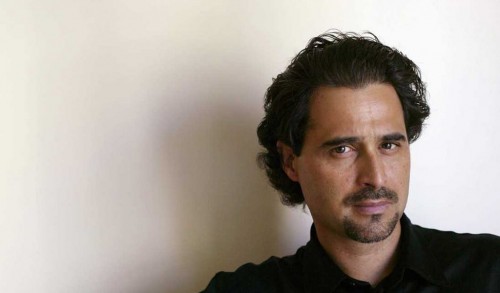Present in this excerpt from A General Theory of Oblivion, translated by Daniel Hahn, are some of the recurring themes of the novel: rescue, rebirth, metaphysics, and an example of unexpected kindness alongside violence involving individuals, factions, and nations, as well as the hint of remorse, perhaps on the way to redemption. The language is relaxed and the details vivid. In the last lines those who engage in brutality are said to acknowledge the power of words. Put another way, Agualusa shows that civilization is held in regard even as vengeance, chaos, and an eternal thirst for more, threaten to swallow his country. —Jeff Bursey
.
Any one of us, over the course of our lives, can know many different existences. Or occasionally, desistances. Not many, however, are given the opportunity to wear a different skin. Jeremias Carrasco had something very like this happen to him. He awoke, after facing a careless firing squad, in a bed that was too short for his six feet, and so narrow that were he to uncross his arms they would both hang down with their fingers touching the cement floor, one on each side. He had a lot of pain in his mouth, neck, and chest, and terrible trouble breathing. He saw, on opening his eyes, a low ceiling that was discolored and cracked. A small gecko, hanging directly above him, was studying him curiously. The morning was coming in, wavy and scented, through a tiny window high up on the facing wall, just below the ceiling.
“I’ve died,” thought Jeremias. “I’ve died, and that gecko is God.”
Even supposing that the gecko was indeed God, he would appear to be hesitating about what fate to assign to him. To Jeremias this indecision was even stranger than finding himself face-to-face with the Creator and the fact that He had taken on the form of a reptile. Jeremias knew, and had known for quite some time, that he was destined to burn for all eternity in the flames of Hell. He had killed, he had tortured. And if he’d started off doing those things out of duty, obeying orders, he had later acquired a taste for it. He only felt awake, whole, when he was racing through the night, in pursuit of other men.
“Make your mind up,” said Jeremias to the gecko. Or rather, he tried to say, but all that came out of his mouth was a dull, tangled thread of sounds. He made a second attempt, and, as in a nightmare, the dark rush of noise came again.
“Don’t try to talk. Actually, you’re not going to talk ever again.” Jeremias believed, for some moments, that it was God who was condemning him to eternal silence. Then he turned his eyes toward the right and saw a hugely fat woman leaning against the door. Her hands, with tiny, fragile fingers, danced before her as she spoke:
“Yesterday they announced your death in the newspapers. They published a photograph, it was quite an old one, I almost didn’t recognize you. They said you were a devil. You died, you were reborn, and you have another chance. Make the most of it.”
Madalena had been working at the Maria Pia Hospital for five years. Before that she had been a nun. A neighbor had witnessed the shooting of the mercenaries at a distance and had notified her. The nurse drove to the site on her own. One of the men was still alive. A bullet had passed through his chest, on a miraculous, perfect course that hadn’t hit a single vital organ. A second projectile had gone into his mouth, shattering his two upper incisors, then perforating his throat.
“I don’t understand what happened. Were you trying to catch the bullet in your teeth?” She laughed, her body shaking. The light seemed to laugh with her. “Yes, sir, those are some good reflexes. And it wasn’t even such a bad idea, either. If the bullet hadn’t found your teeth, it would have taken a different direction. It would have killed you or left you paralyzed. I thought it best not to take you to the hospital. They would take care of you and then when you were recovered they’d only shoot you again. So be patient, and I’ll look after you myself with what little resources there are. I just have to get you out of Luanda. I don’t know how long I’ll be able to hide you. If the comrades find you, they’ll shoot me, too. As soon as possible we’ll travel south.”
She hid him for nearly five months. By listening to the radio, Jeremias was able to follow the difficult progress of the government troops, supported by the Cubans, against the improvised, unstable alliance between the UNITA party, the National Front, the South African army, and mercenaries from Portugal, England, and North America.
Jeremias was dancing on the beach, in Cascais, with a platinum blonde, and he had never been in a war, never killed, never tortured anyone, when Madalena shook him:
“Come on, Captain! We go today or never.”
The mercenary sat up in bed, with some effort. The rain was crackling in the darkness, muffling the noise of what sparse traffic there was at that time. They were to travel in a little old van, a Citroën 2CV, its yellow bodywork badly worn, eaten away by rust, but with its engine in perfect working order. Jeremias was stretched out on the backseat, hidden by various crates of books.
“Books instill respect,” explained the nurse. “If you carry crates full of beer bottles, the soldiers will search every inch of the vehicle. Besides which, you’ll get to Moçâmedes without a single bottle left.”
—José Eduardo Agualusa, translated by Daniel Hahn
.
.
